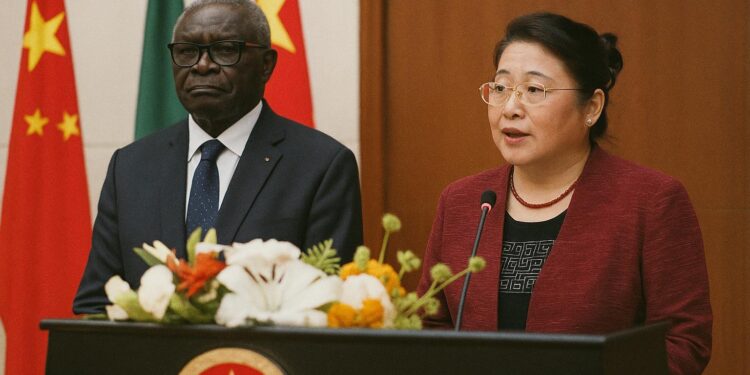Diplomatic symbolism in Brazzaville ceremony
The garden of the Chinese chancery in Brazzaville rarely hosts events that fuse pageantry with geostrategic nuance, yet the commemoration of the People’s Liberation Army’s ninety-eighth birthday accomplished precisely that. Standing before an audience that included Defence Minister Charles Richard Mondjo and a cross-section of Central African diplomats, Ambassador An Qing underscored the PLA’s historic role in safeguarding China’s sovereignty and, by extension, its growing ability to shoulder international responsibilities. Her intervention, delivered in meticulous French before a simultaneous English translation, balanced historical reflection with forward-looking pledges, projecting continuity in Beijing’s military doctrine while reassuring Congolese officials of China’s enduring commitment to mutually beneficial cooperation.
The event’s choreography—PLA martial music softened by Congolese percussion, flags intertwined against a backdrop of discreet security—was carefully curated to signal parity. It echoed a broader trend in Chinese diplomacy that pairs ritual respect for host nations with subtle reminders of China’s modern capabilities. Analysts present noted that Ambassador An’s references to “shared victories” situated Brazzaville not as a peripheral recipient of largesse but as an actor in a collective quest for stability.
PLA’s evolving mandate and global footprint
The ambassador’s statistics were familiar yet striking. With over half a million Chinese peacekeepers deployed since 1992 and a current rank as the foremost troop contributor among permanent Security Council members, the PLA’s operational remit has expanded well beyond its traditional perimeter (UN Peacekeeping data 2023). Beijing’s decision to retain the position of second-largest financial contributor to peace operations reinforces that trajectory. Chinese commentators argue that such engagement illustrates the ‘responsible stakeholder’ posture promoted since the early 2000s; Western observers, for their part, increasingly acknowledge the professionalism of Chinese contingents in Lebanon, South Sudan and the Democratic Republic of Congo.
From Beijing’s vantage point, the PLA’s external presence answers a dual imperative: protecting far-flung economic corridors and projecting normative credibility. Defence White Papers released in 2019 and 2022 place equal emphasis on sovereignty defence and ‘building a community with a shared future for mankind’ (Chinese Ministry of National Defense 2022). In this framing, humanitarian de-mining in Africa and escort missions in the Gulf of Aden complement deterrence in the Taiwan Strait, illustrating a multidimensional force calibrated for both hard and soft power.
Synergy with Congolese Armed Forces reaches operational phase
While military engagement between Beijing and Brazzaville dates back to the 1980s, recent years have seen a qualitative leap. Joint naval drills on the Congo River in 2022, followed by a training programme that placed Congolese sailors aboard a PLA Navy logistics vessel in Zhoushan, signal an operational maturity previously confined to China’s partnerships with larger African militaries (Congolese Ministry of Defence communiqué 2022). Congolese officers interviewed at the ceremony stressed the hands-on nature of the curriculum: navigation systems, maritime search-and-rescue, and legal standards under the Yaoundé Code of Conduct designed to curb piracy in the Gulf of Guinea.
Senior planners in Brazzaville frame these initiatives as force multipliers rather than dependency vectors. They point to the upcoming overhaul of Pointe-Noire’s naval base, funded through a concessionary loan from the Export-Import Bank of China, as an example of how infrastructure modernisation dovetails with capability transfer. For Beijing, the investment aligns with its Maritime Silk Road blueprint, reinforcing a logistical chain that arcs from Hainan to Libreville. Both sides therefore depict the defence partnership as converging with, rather than supplanting, Congo’s regional obligations under ECCAS and the African Union.
Economic gravitas underlying the security dialogue
Beyond drills and uniforms lies a robust commercial rapport. China has remained Congo-Brazzaville’s principal trading partner for five consecutive years, with two-way trade exceeding USD 5 billion in 2023, according to customs data cited by the Congolese Ministry of Finance. The Joint Declaration on the prospective Economic Partnership Agreement for Shared Prosperity, initialled in Beijing last March, offers a framework that blends tariff concessions with technology transfer. Observers in Brazzaville view the document as a pivot away from raw-commodity dependence toward agro-industrial diversification—an ambition mirrored in the national Development Strategy 2022-2026 endorsed by President Denis Sassou Nguesso.
In this context, security cooperation is perceived less as an isolated dimension than as a confidence-building mechanism. Companies engaged in mining and forestry projects along the Sangha corridor privately acknowledge that the presence of PLA-trained Congolese units has streamlined logistics and reduced insurance premiums. For Chinese enterprises, the calculus is equally clear: a stable host environment mitigates reputational and financial risk, thereby sustaining the viability of long-term Belt and Road investments.
Prospects for a shared security architecture
Looking ahead, planners in both capitals are weighing a triad of initiatives: a biennial strategic dialogue between the two defence ministries, a scholarship programme for Congolese cadets at China’s National Defense University, and a pilot project integrating Chinese satellite imagery into Congo’s border-surveillance network. Each strand aims to extend interoperability without compromising national sovereignty, a red line repeatedly emphasised by Minister Mondjo.
Diplomatic observers caution that successful implementation will require meticulous alignment with multilateral norms. Yet there is cautious optimism that Brazzaville’s stabilising role in Central Africa could amplify Beijing’s preference for non-interference coupled with pragmatic security engagement. As Ambassador An concluded in a brief exchange with journalists, the objective is “to craft security dividends that resonate from the banks of the Congo River to the corridors of the United Nations” (Xinhua interview notes 2024). In the measured language of diplomacy, the message was unmistakable: the PLA’s celebratory march in Brazzaville is less a one-day spectacle than a strategic overture to decades of calibrated partnership.












































